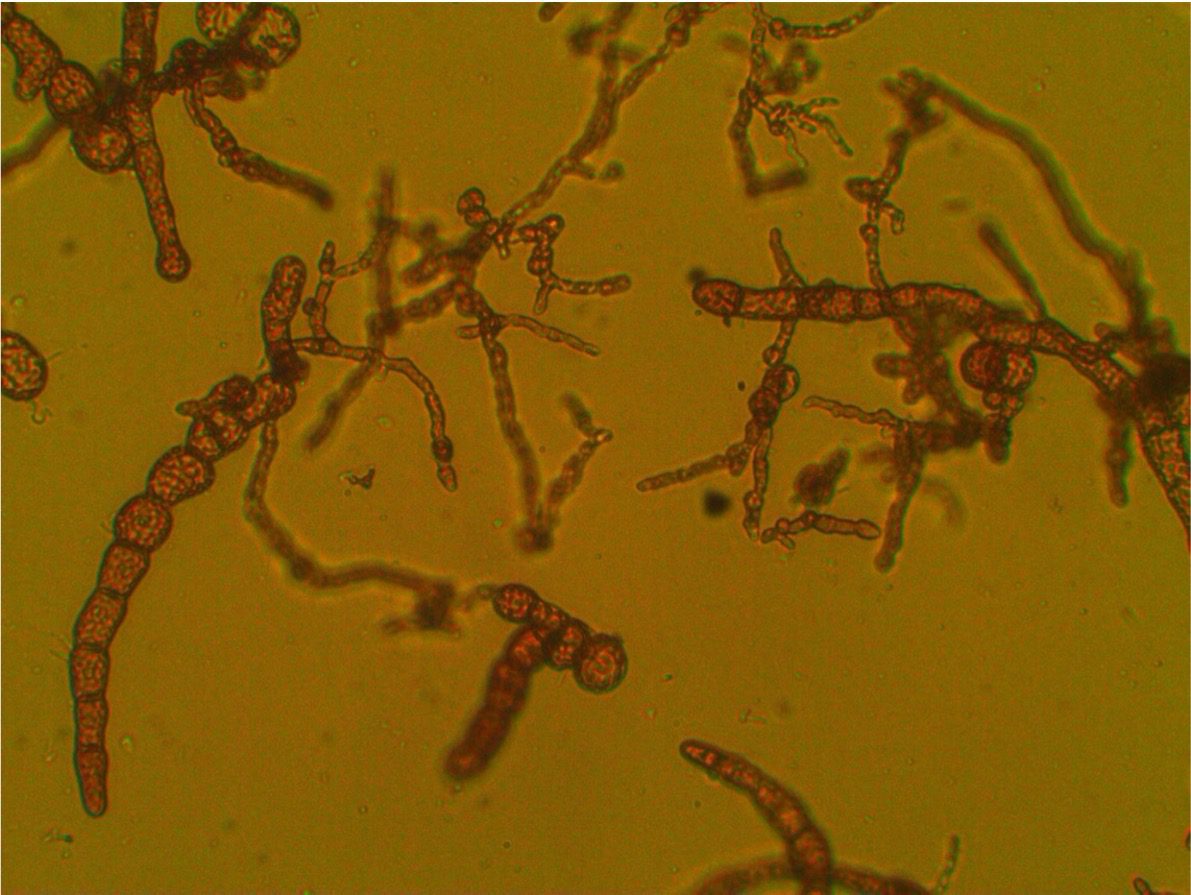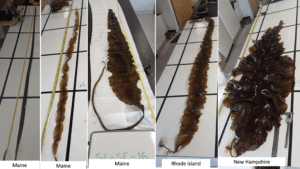Innovative, new “road map” for kelp crop improvement
 Female and male kelp gametophytes, which are the microscopic sexual stage in the life cycle of macroalgae. These gametophytes are part of a recently developed kelp germplasm containing more than 1,200 unique individuals developed and isolated by WHOI and UConn-led teams. Image credit: Yarish Lab, UConn
Female and male kelp gametophytes, which are the microscopic sexual stage in the life cycle of macroalgae. These gametophytes are part of a recently developed kelp germplasm containing more than 1,200 unique individuals developed and isolated by WHOI and UConn-led teams. Image credit: Yarish Lab, UConn June 24, 2022
Woods Hole Oceanographic Institution and University of Connecticut license kelp germplasm collection to Bigelow Laboratory for Ocean Sciences
Woods Hole, MA – Woods Hole Oceanographic Institution (WHOI), the University of Connecticut, and Bigelow Laboratory for Ocean Sciences have executed a license agreement for a kelp germplasm, or collection of microscopic cells called gametophytes, containing more than 1,200 samples all developed and isolated by WHOI and UConn-led teams. Bigelow Laboratory’s National Center for Marine Algae and Microbiota plans to maintain, market, and distribute the germplasm collection for broad use.
“Expanding our marine macroalgae holdings is part of our strategic vision as the curators of the United States marine algae germplasm collection to increase support for global algae science," said Michael Lomas, director of the National Center for Marine Algae and Microbiota. "This agreement with UConn and WHOI provides a unique opportunity to diversify our collection and help harness algae's potential for remarkable scientific discoveries.”
Currently, macroalgae (seaweed) is primarily used as food for human consumption, but there is a growing opportunity for the production of macroalgae for other sustainable uses ranging from nutraceuticals, animal and aquafeeds to biofuels. This collection was collaboratively designed and tested for selective breeding that would increase productivity, reduce the cost of macroalgal farming, and improve the consistency and predictability of the germplasm “seed.” It includes many of the samples’ whole genome sequences and the traits associated with crosses between the males and female gametophytes. Gametophytes are the sexual phase in the life cycle of plants and these brown macroscopic macroalgae.
“Creating the kelp germplasm collection with associated gene sequences and an annotated reference genome is like having an instruction manual or an open-source road map for crop improvement,” said Scott Lindell, WHOI research specialist and germplasm co-developer. “The data provided can assist in predicting the capabilities of how well a parent and its offspring will do for specific traits, such as growth rate and heat tolerance.”
“This kelp culture collection will be essential for the preservation of heirloom strains, biodiversity conservation, ecosystem restoration and mariculture,” said Charles Yarish, professor emeritus at UConn and visiting scholar at WHOI. Yarish co-authored a PLOS Biology paper and a UNU-CRIS paper that further investigate aquaculture and germplasm banking. “It contains genotype and phenotype profiles offering great starting points as model systems for numerous research possibilities, including optimization of biorefining pipelines, development of new macroalgal products and byproducts, and exploration of macroalgal applications for climate change mitigation.”

Several kelp blades collected from the wild are put on a table to be measured and analyzed; the samples are represented in a new kelp germplasm collection organized by WHOI and UConn, and recently licensed to Bigelow Laboratories. Image credit: David Bailey/©WHOI
The germplasm collection was supported by the ARPAe MARINER program (Macroalgae Research Inspiring Novel Energy Resources), which develops tools to enable the United States to become a global leader in the production of seaweed biomass.
The developed collection is also part of Sugar Kelp Base, an online database developed by cooperators at the United States Department of Agriculture and Cornell University, and designed for advanced methods in kelp breeding. Sugar kelp is a vital part of the Northern Hemisphere’s ocean ecosystem; it aids in removing carbon dioxide and releasing oxygen, balances ocean acidification, and serves as a sustainable food source. Sugar Kelp Base tracks the performance of hundreds of family crosses for dozens of traits, covering the last four years of field trials funded by ARPAe and the World Wildlife Fund. The WHOI-UConn collection will enable others to participate and contribute to this open-source hub of phenotypic information.
“This is the age of genomics when having such data can enable predictive capabilities about how a parent and its offspring will perform for certain traits, further opening up more targeted breeding possibilities while preserving genetic diversity.” said Lindell.
###
About Woods Hole Oceanographic Institution
Woods Hole Oceanographic Institution (WHOI) is a private, non-profit organization on Cape Cod, Massachusetts, dedicated to marine research, engineering, and higher education. Established in 1930, its mission is to understand the ocean and its interactions with the Earth as a whole, and to communicate an understanding of the ocean’s role in the changing global environment. WHOI’s pioneering discoveries stem from an ideal combination of science and engineering—one that has made it one of the most trusted and technically advanced leaders in fundamental and applied ocean research and exploration anywhere. WHOI is known for its multidisciplinary approach, superior ship operations, and unparalleled deep-sea robotics capabilities. We play a leading role in ocean observation, and operate the most extensive suite of ocean data-gathering platforms in the world. Top scientists, engineers, and students collaborate on more than 800 concurrent projects worldwide—both above and below the waves—pushing the boundaries of knowledge to inform people and policies for a healthier planet. For more information, please visit www.whoi.edu
About UConn TCS
Under the umbrella of UConn’s Office of the Vice President for Research, Technology Commercialization Services (TCS) works with innovators, entrepreneurs, investors, and industry partners to transform UConn discoveries into products, companies, and jobs that benefit society and fuel economic development. Through a coordinated approach between tech transfer, licensing, and startup teams, TCS provides service that enables success for faculty, business, Connecticut, and beyond.
About Bigelow Laboratory for Ocean Sciences
Bigelow Laboratory for Ocean Sciences is an independent, nonprofit research institute located in East Boothbay, Maine. From the Arctic to the Antarctic, Bigelow Laboratory scientists use innovative approaches to study the foundation of global ocean health and unlock its potential to improve the future for all life on the planet. Learn more at bigelow.org, and join the conversation on Facebook, Instagram, and Twitter.
